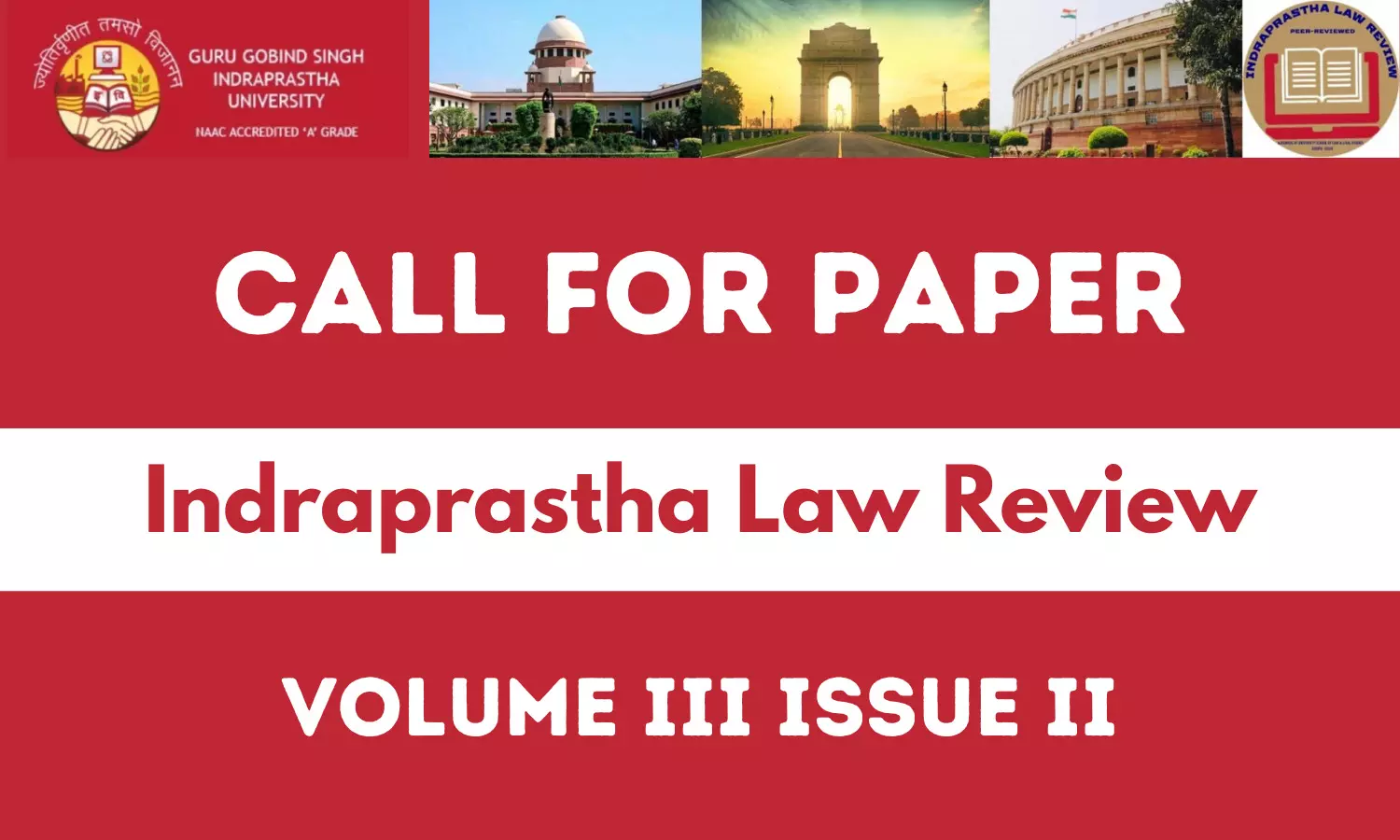Call for Papers | Indraprastha Law Review Winter 2022 Vol III Issue II | USLLS, GGSIPU | Deadline - January 30th, 2023
Call for Papers is being invited by Guru Gobind Singh Indraprastha University for Indraprastha Law Review Winter 2022 Vol III Issue II by January 30th, 2023.

Call for Papers is being invited by Guru Gobind Singh Indraprastha University for Indraprastha Law Review Winter 2022 Vol III Issue II by January 30th, 2023.
About the University
Guru Gobind Singh Indraprastha University (GGSIPU) is the first university established in 1998 by Govt. of NCT of Delhi under the provisions of Guru Gobind Singh Indraprastha University Act, 1998 read with its Amendment in 1999 The University is recognized by University Grants Commission (UGC), India under section 12B of UGC Act.
University School of Law and Legal Studies (USLLS), New Delhi, a constituent of Guru Gobind Singh Indraprastha University (GGSIPU), envisages advancement of institutional expertise in the area of legal research and education by augmenting academic and professional excellence, developing critical and relentless engagement with legal theory and practice, synergizing law, legal research, legal education and action to further the quest for justice.
About Indraprastha Law Review Winter 2022 Vol III Issue II
University School of Law and Legal Studies (USLLS) under the aegis of Guru Gobind Singh Indraprastha University, Delhi takes great pleasure to inform you that the Indraprastha Law Review (ILR) has received encouraging response and the Editorial Board has successfully published the inaugural editions of ILR Summer 2020: Vol. I Issue I, Winter 2020: Vol. I Issue II, Summer 2021: Vol. II Issue I, Winter 2021: Vol. II Issue II & Summer 2022: Vol. III Issue I.
Indraprastha Law Review (ILR) [ISSN No. 2583-5653] is an eco-friendly, multidisciplinary faculty run double peer-reviewed e-journal with an editorial board comprising of experts from the legal field. We abide by our publication policies by avoiding usage of paper as much as possible. We have also made the Journal accessible to everyone from all over the world by simply visiting the official website of the e-journal i.e. www.indraprasthalawreview.in
ILR aims to promote legal research in various developing dimensions and discourse on the same. It is double-blind peer reviewed with the fundamental premise being to promote interdisciplinary research, entailing a detailed study of law and legal studies and its discourse with other disciplines. The biannual journal is being published with the objectives to provide a space to researchers, jurists, academicians and legal practitioners to express their views on topics of contemporary significance in law.
We solicit contributions for the Winter 2022: Vol. III Issue II in the form of article, legislative comment, book review and case comment.
Submission Guidelines
- All submissions are required to be addressed to the Editor-in-Chief, Indraprastha Law Review, University School of Law and Legal Studies, GGS IP University, Delhi - India.
- All entries by interested parties must be mailed to [email protected] by 11:59 PM, January 30th, 2023, with the subject: ILR Winter 2022: Vol. III Issue II with specifying the classification of manuscript i.e. Article, Legislative Comment, Book Review, Case Comment.
- Contribution sent after the last date may be considered for Summer 2023: Vol. IV Issue I subject to the quality of article and plagiarism clearance as per the UGC guidelines.
- The copyright of the entry to the e-Journal will rest with the Editorial Board once the entry has been selected and the Author(s) of the same have been notified.
- The name of the Author(s) or any mode of identification should not be included in the manuscript. The cover letter should have the requisite contact details of the Author(s) along with an undertaking of originality and Copyright Form Available Here
- The Citation pattern to be uniformly followed is Journal of the Indian Law Institute. The body of the manuscript shall be in Times New Roman, size 12, 1.5 line spacing. Citations shall be in Times New Roman, size 10, single line spacing. Click Here
- Speaking footnotes are discouraged.
- The entries shall be accepted only in MS Word (.doc, .docx)
- Co-Authorship of one person other than the author is allowed.
- The entries submitted shall be original and the plagiarism norms of the UGC shall be applicable to the submissions.
- There is no publication fee.
Note: All the submissions shall be put to double stage blind peer review and only on the recommendations of the reviewers, the papers submitted shall be considered for publication on Indraprastha Law Review website. Only shortlisted manuscripts will be contacted via email. If you do not hear from us within two weeks of the deadline, please assume that your manuscript has not succeeded. Unfortunately, we will not be able to reply to individual queries about the status of their manuscript.
Submissions Types
- Book Reviews: 1000 - 2000 words.
- Case Commentaries: 1500 - 2500 words.
- Legislative Comments: 1500 - 2500 words.
- Articles: 5000 - 8000 words (including footnotes)
Text Format
The length of the manuscript should not exceed 8000 words. Manuscripts shall be formatted according to the following guidelines.
- It shall be in Microsoft word format and 1.5 line spacing.
- All citations shall be placed in foot-notes.
- All manuscripts should include an introduction and conclusion.
- Number less than 100 shall be spelt out unless they are a percent (e.g., 5 percent).
- Italics or quotes for emphasizing shall be used very sparingly.
- Charts, graphs, etc., shall be used very sparingly.
- Use of first person shall be avoided.
- All pages shall be numbered.
- It shall include an abstract of not more than 250 words, and are to be included with the final draft of paper.
- Uniform date format shall be used (e.g., August 15, 1947).
Use of Footnotes
Indraprastha Law Review prefers footnotes (to endnotes) mainly because of the following reasons:
- To identify the source of quotations or paraphrases;
- To acknowledge indebtedness for words, phrases or ideas borrowed;
- To explain where additional evidence or commentary may be found;
- To provide additional material or discussion that is relevant but which would disrupt the flow of the text if it were included in the paper itself, and
- To refer the reader to other parts of the paper
- To enable the reader to read the reference without having to turn to the end of the text which would otherwise tend to disrupt the flow of the text and hamper smooth reading.
Contact
Submitted By: Organising Committee
Important Links
Important Links Law Library: Notes and Study Material for LLB, LLM, Judiciary, and Entrance Exams

